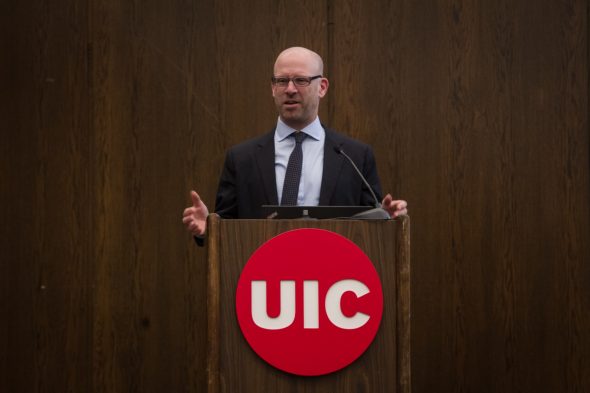Campus Conversation examines health impact of racial resentment

White Americans who vote for policies centered around whiteness and white power shorten their own lives, according to sociologist and psychiatrist John Metzl.
Metzl investigates why in his new book, “Dying of Whiteness: How the Politics of Racial Resentment is Killing America’s Heartland.” He shared his findings and theories of how voters come to support policies that override their best interests in terms of health care, education and overall quality of life during the April 2 Campus Conversation. The event, held in Student Center West, was co-sponsored by the Office of the Provost and Vice Chancellor for Academic Affairs and the UIC Institute for Research on Race and Public Policy.
He started his talk by explaining his research on white, working-class Southerners and Midwesterners. Many believed privileges, money and resources belonging to white Americans were being usurped by minorities and immigrants.
This ideology led some in Tennessee to block Medicaid expansion in the state when supporting such policies could have helped white Americans like them, people who were dying from real medical illnesses due to lack of preventative care and access to medical care or medication.
“There was this idea out there that, ‘We’re not going to support this system because it represents this misallocation of particular kinds of resources, and therefore,’ and this is the important thing, ‘we’re going to lay our own lives down on the line in order to support this,’” Metzl said.
For this tradeoff, white populations in Tennessee lost about two to three weeks of life for every white citizen in the state.
And the impacts of health care laws are just one example.
“If you’re a working-class white person and you support policies that are anti-government, anti-immigrant, pro-gun policies, the way they are enacted in these particular states, these factors become as dangerous to you as asbestos or second-hand smoke,” he said. “They actually become risk factors.”
When Amanda Lewis, professor of African American Studies, asked how people can use this data, particularly health data, to help white Americans think differently, Metzl said the best approach is not trying to change someone’s mind.
“It’s about sowing the seeds that I think will change discourse here…it’s about conservatives having their own progressive movement, and starting to say, ‘We actually deserve better health benefits.’ I think that would be a point of
